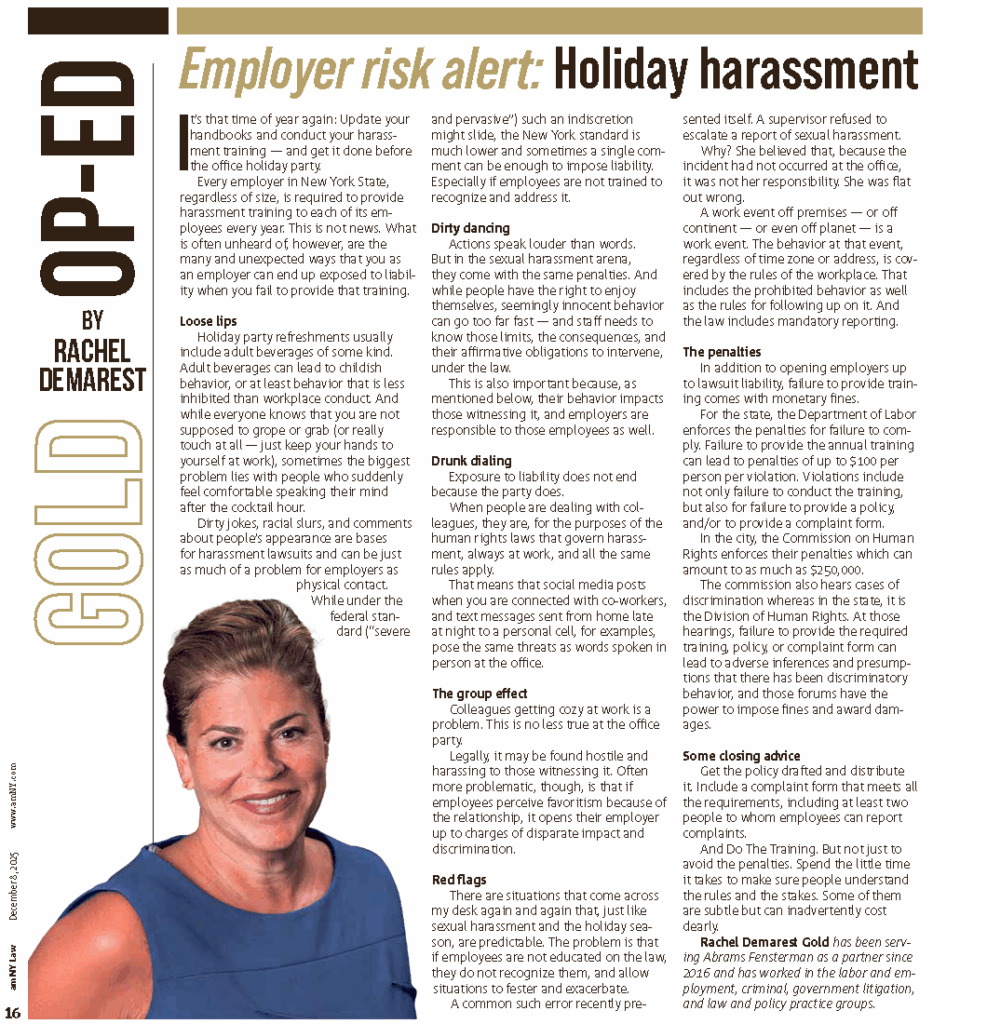By David Verschell, Esq. and Basil Kim, JD, MPH
“View Article As Seen In New York County Medical Society – MM News: Legal Briefs”
For years, family practitioners and specialists alike would routinely forgive co-pays, co-insurance, and deductibles as a courtesy to patients in need of medical attention. However, such actions can be costly, as insurers are no longer turning a blind eye to this practice, identifying it as a form of insurance fraud. Indeed, the routine waiver of co-pays, co-insurance, and deductibles now places physicians and patients at risk for civil, regulatory, and potential criminal liability for insurance fraud. [i] Increased private and government funding (on both the federal and state level) has been dedicated toward the elimination of health care fraud. Although other states, including New Jersey, have seen fit (so far), to leave the decision of whether to waive a co-pay and/or co-insurance to the physician’s business judgment, [ii] the laws and regulatory opinions in New York are quite the opposite, and the risk to physicians who engage in this practice in New York has never been greater. This is not to say that physicians can never waive a portion of their fees, but they need to understand when it is appropriate and acceptable.
There are three primary contentions that private and governmental insurers set forth in asserting that the waiver of co-payments and co-insurance is an improper business practice:
- First, the waiver is an improper inducement or kickback, used to entice patients to get care, or more care, at that particular provider over another;
- Second, the waiver is used by healthcare practices to reduce costs related to processing insurance paperwork and collection costs; [iii]
- Third, an improper waiver is actually a false claim filing. The rationale is this: if the cost of providing a service is $100, and 20% is to be covered by the patient, the insurance company will then cover 80%, or $80. However, if the physician routinely waives the patient’s obligation, then the physician is actually only charging $80 for the service, and the insurance company should then be responsible for 80% of $80, or $64. Billing the insurance company for $100 is then considered an actionable false claim. [iv]
Physicians may reasonably fear that, in geographic areas where there is a long-standing and prevalent “culture of nonpayment” [v], patients have an unjustified expectation that co-pay and co-insurance payments will be waived as a matter of course, and physicians who do not choose to engage in the practice will lose business to those that will. Unfortunately, “I am only doing what my neighbor is doing” is neither an excuse nor a defense to the practice. However, because this practice subjects patients themselves to the very same potential for civil and criminal liability, a well-informed patient base may be the best defense to a competitor willing to engage in this type of “pricing war.”
What are the potential repercussions for engaging in this practice? For the physician, the New York State Department of Health has made it clear that the improper waiver or forgiveness of patient obligations constitutes insurance fraud. The primary implication of this opinion, of course, is that the improper waiver of patient obligations could lead to disciplinary action. Any health care provider that has been the subject of an investigation by the Office of Professional Medical Conduct or the Office of Professional Discipline will tell you that such investigations, even those which are unjustified, are full of anguish and distress, not to mention economic cost when legal assistance is required.
New York criminal statutes also provide penalties for the practice. Specifically, this practice by providers and patients may be actionable under New York Penal Law §176.05, which defines insurance fraud as follows:
- A fraudulent insurance act is committed by any person who, knowingly and with intent to defraud, presents, causes to be presented, or prepares with knowledge or belief that it will be presented to or by an insurer… or any agent thereof, any written statement as part of, or in support of… a claim for payment or other benefit pursuant to an insurance policy… for… personal insurance which he knows to: (i) contain materially false information concerning any fact material thereto…
- A fraudulent health care insurance act is committed by any person who, knowingly and with intent to defraud, presents, causes to be presented, or prepares with knowledge or belief that it will be presented to, or by, an insurer … or any agent thereof, … a claim for payment, services or other benefit pursuant to such policy, contract or plan, which he knows to: (a) contain materially false information concerning any material fact thereto; or (b) conceal, for the purpose of misleading, information concerning any fact material thereto…
Further, for Medicare and/or Medicaid recipients and their providers, the practice may be interpreted as the filing of a false claim to the government in violation of 18 U.S.C. 287 and 1001, 31 U.S.C. 3729, and 42 CFR 1320a-7(a). Potential penalties include imprisonment, criminal fines, civil damages and forfeitures, civil monetary penalties, and exclusion from Medicare and state health care programs. Physicians that routinely waive copayments may also be criminally prosecuted under 42 U.S.C. 1320a-7b(b) and excluded from participating in Medicare and state health care programs per the anti-kickback statute. 42 U.S.C. 1320a-7(b)(7). [vi]
So when is it acceptable to forgive a patient’s obligation for health care fees? The Department of Health has stated that it is acceptable for physicians to forgive these obligations for patients who are in need of, but can not otherwise afford, appropriate medical care and treatment. According to the Compliance Guide for Medical Practice, published by the American Medical Association, “[t]he waiver of copayments and deductibles and the provision of free services, except in limited situations due to the patient’s financial or medical indigence, may be viewed as a violation of law or a violation of the physician’s participation agreements with insurance companies.” [vii][viii] However, “a decision, in the exercise of business judgment, not to pursue the full legal remedies available to collect a debt would not constitute insurance fraud.” [ix] These scenarios would include patients who have suffered financial hardship (though at the time of treatment they may have been financially “stable”), or situations where the costs of pursuing collection efforts would exceed the value of the potential recovery (i.e., the patient obligation). Additionally, the New York Insurance Department has opined that if a provider does choose to waive a co-payment that would be otherwise applicable, liability for insurance fraud may be avoided if the insurer is made aware of the waiver (although the subsequent payment amount may be lowered). [x] Finally, if a physician were to occasionally waive a co-insurance, co-payment, or deductible payment as a courtesy to a family member, fellow physician, or for an indigent patient, the provider would not be found guilty of insurance fraud.
It is only in a limited, narrow set of situations where the waiver of a co-payment or co-insurance would be acceptable. There are a myriad of suggestions offered to physicians regarding how to protect themselves from being accused of any type of insurance fraud, the majority of which are either transparent or not practical. Generally, the best advice is to keep it simple and keep close track. For those situations where a waiver is provided due the patient’s economic situation, physicians would be wise to document their good faith attempts to understand the patient’s situation, beliefs, and conversations with the patient. For situations where pursing legal action to collect a patient’s obligation would not be economically justifiable, physicians should document what good faith attempts to collect payment, short of legal action, were made (e.g., letter writing, phone calls, etc.).
Finally, while it is certainly a business decision as to how far a physician will go to pursue the collection of co-pays and co-insurance, the failure to bill patients or the automatic waiver of all co-pays and co-insurance is clearly fraught with liability for the practitioner for the many reasons listed above.
David Verschell, Esq., is the head of the Insurance and Audit division of Abrams, Fensterman, Fensterman, Eisman, Formato, Ferrara, Wolf & Carone, LLP. If you have any further questions about this issue, please feel free to contact Mr. Verschell.
The information presented in this article is intended for educational purposes only and does not constitute legal advice. In cases of specific legal questions always contact an attorney.
[i]The Office of General Counsel of the State of New York Insurance Department and the Office of the Inspector General of the United States Department of Health and Human Services have both released a number of opinions and alerts addressing this issue which all support the findings in this article. See State of New York Insurance Department Opinions: 08-04-04 (4/2/08), 08-03-19 (3/27/08), 05-04-7 (4/8/05), 04-02-25 (2/24/04), 03-04-09 (4/4/03), 2/6/01, 00-12-06 (12/14/00); Dept. of Health and Human Services, Publication of OIG Special Fraud Alerts. Federal Register, 12/19/1994.
[ii]The Appellate Division of the state of New Jersey recently upheld a lower court decision stating that physician owners of a facility did not violate the New Jersey Insurance Fraud Prevention Act by failing to disclose the frequent waiver of co-insurance due on facility fees. Further, the court held that there was no New Jersey rule, regulation, or directive from any administrative or licensing agency barring the waiver of co-pays or co-insurance.
[iii]State of New York Insurance Department Opinions: 08-04-04 (4/2/08), 08-03-19 (3/27/08), 05-04-7 (4/8/05), 04-02-25 (2/24/04), 03-04-09 (4/4/03), 2/6/01, 00-12-06 (12/14/00); Dept. of Health and Human Services, Publication of OIG Special Fraud Alerts. Federal Register, 12/19/1994.
[iv]Patient Financial Services Weekly Advisor, April 1, 2005. Beware of waiving copays and deductibles. (http://www.hcpro.com/REV-46459-2477/Beware-of-waiving-copays-and-deductibles.html)
[v]Dr. Michael Fleming, past president of the American Academy of Family Physicians, reported that the waiver of copayments was most common in “areas that are saturated by managed care,” such as the Northeast, South Florida, the West Coast, and the upper Midwest. Medscape Today, Getting Patients to Pay Their Copay. Nancy R. Terry. (http://www.medscape.com/viewarticle/589557)
[vi]Department of Health and Human Services, Publication of OIG Special Fraud Alerts. Federal Register, 12/19/1994.
[vii]Trites, PA.. Compliance Guide for the Medical Practice: How to Attain and Maintain a Compliant Medical Practice. Chicago, Ill: American Medical Association; 2006.
[viii]According to AMA Opinion 6.12 – Forgiveness or Waiver of Insurance Copayments, June 1993, the AMA stated that “Physicians should be aware that forgiveness or waiver of copayments may violate the policies of some insurers, both public and private; other insurers may permit forgiveness or waiver if they are aware of the reasons for the forgiveness or waiver. Routine forgiveness or waiver of copayments may constitute fraud under state and federal law.”
[ix]Opinion, The Office of General Counsel, April 4, 2003, RE: Non-participating Healthcare Provider; Balance Billing. (http://www.ins.state.ny.us/ogco2003/rg030409.htm)
[x]State of New York Insurance Department Opinions: 08-04-04 (4/2/08), citing State of New York Insurance Department Opinions: 00-12-06 (12/14/00) and 08-03-19 (3/27/08).





